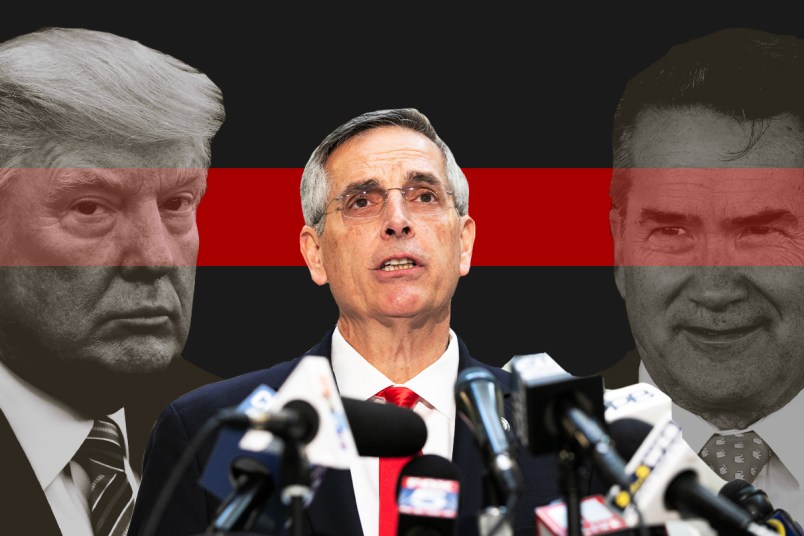This article is part of TPM Cafe, TPM’s home for opinion and news analysis.
Amid growing concern about the prospects for a free and fair election in 2024, last week brought a rare piece of good news: Georgia Secretary of State Brad Raffensperger, who famously stared down President Donald Trump’s bid to strong-arm him into reversing the state’s 2020 election results, overcame a Republican primary challenge from Rep. Jody Hice, a vocal denier of the 2020 presidential outcome. Had Hice won the nomination and prevailed in November to become Georgia’s top election official, he would have been in a position to subvert the will of voters in a key presidential swing state.
But let’s not celebrate too much. It’s worth noting that to re-establish his GOP bona fides after angering Trump, Raffensperger was forced to run on a platform designed for the base. His need to appeal to his party is just one example of partisanship influencing leaders in election administration. This tension between doing the right thing for voters versus appealing to a partisan political platform puts secretaries of states in an untenable position.
It isn’t only in Georgia that our nation faces these challenges. Every state’s top election official, as well as at least 60 percent of their local counterparts, enters office with ties to a political party — making the U.S. an outlier among advanced democracies. Canada, Great Britain and Australia, for example, pick equivalents of secretaries of state by appointment based on qualifications and without regard to political party.
There might once have been a time when, despite their partisan affiliations, we could nonetheless count on election officials to act impartially. But in today’s hyper-polarized era, it’s clear we no longer can. Today, 19 states have seen candidates for secretary of state who either dispute the 2020 election results, express a willingness to overturn the results of a legitimate election, or both. Partisans are also mobilizing to take administrative positions at the local level. It’s perhaps no wonder that as many as 56 percent of Americans have little or no confidence that U.S. elections reflect the will of the people.
Partisanship in election administration crops up across the country. From notorious moments in history like Secretary of State Katherine Harris co-chairing President Bush’s 2000 presidential campaign in Florida, to low-key statements of support at political party events, many state and local election officials don’t hesitate to endorse candidates they favor. Partisanship also creeps up when elections officials themselves run for new posts, using the secretary of state positions as a political step stool for another office. Some 40 percent of secretaries of state serving since 2000 ran for higher offices while still administering elections, and almost none recused themselves from oversight of their own races. On the financial front, election officials at state and local levels actively fundraise for candidates in races they oversee. Even involvement with Political Action Committees (PACs) or super PACs isn’t off limits — and it should be.
When election officials take any of these partisan actions, they undermine the public’s ability to see them as neutral arbiters of election results. If we want fair election administration in which all voters can have confidence, we need much stronger rules to ensure that the people running our elections set aside their party loyalties.
The situation is not hopeless. Policy options include: 1) Selecting election officials using impartial appointment models; 2) Electing these officials in nonpartisan races that remove all party affiliations from the ballot; or 3) Requiring election experience for people running for the posts.
These smart options have merit and should be considered on a state-by-state basis. However, all states should require statutory ethics codes for election officials that prohibit the most egregious activities: fundraising for other candidates; endorsing or opposing candidates; and failing to recuse themselves from oversight of decisions in their own races. Model legislation prepared by the nonpartisan Election Reformers Network with support from Campaign Legal Center aims to do just that.
Many election officials support such reforms. Secretaries of state have told us that a law prohibiting political endorsements would help them say no to such requests. County clerks in states like Washington support reforms to make election administration nonpartisan. And local election officials, including in Virginia, are raising alarms over the increasingly partisan role of party-selected county election boards.
To be clear, our nation is blessed with many election officials who serve tirelessly. We absolutely must protect them from harm or coercion. At the same time, we must insist that election officials’ integrity remain beyond reproach. States must, at minimum, pass ethics codes for elected officials requiring political and financial neutrality, and they must do it right away.
To return to this week’s events in Georgia: Integrity prevailed and voters rewarded a political official who defended democracy in 2020 and did the right thing. But, that path was not easy for Secretary Raffensperger and he had to navigate the tumultuous environment with GOP voters created by conspiracies about the 2020 election. That’s why much more work is needed. Americans deserve election officials who, in all aspects of the job, act as unbiased public servants, not partisans, who simply serve the voting public.
Editors note: This post was initially published with a non-final draft version of this essay. The text has been updated.
Amber McReynolds, a leading expert on election administration, is a consultant on various nonpartisan election reform projects and was appointed by the President to serve as a governor for the United States Postal Service.
Heather Balas is vice president of the Election Reformers Network and a recognized leader on state-based election reforms.






